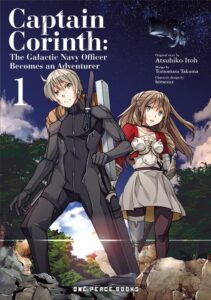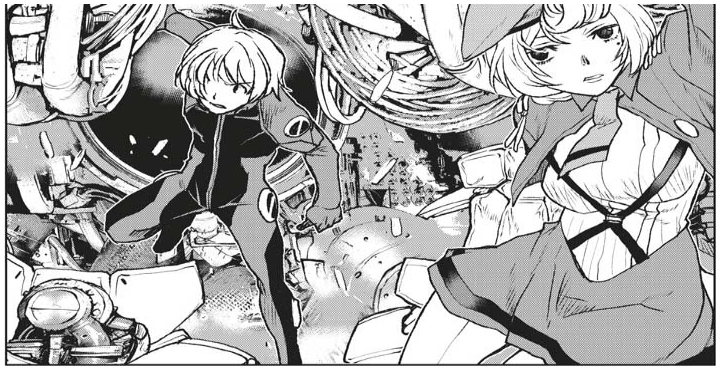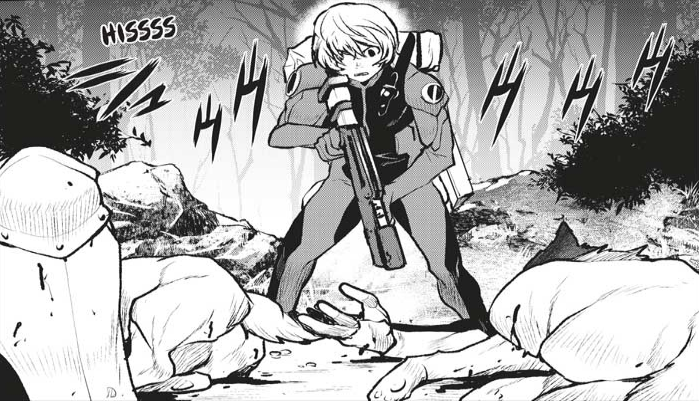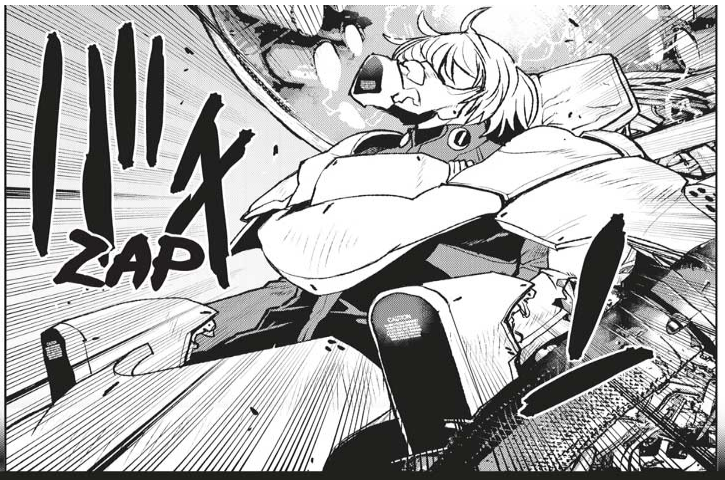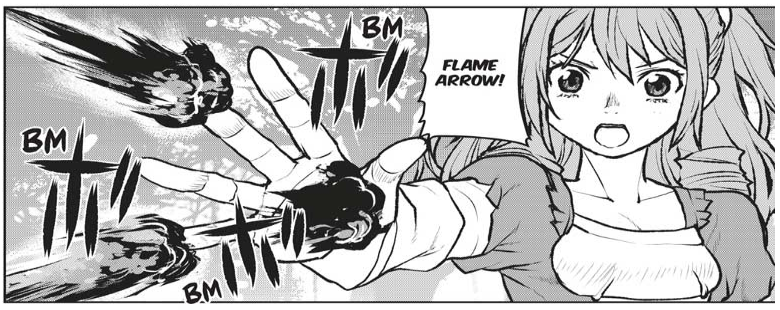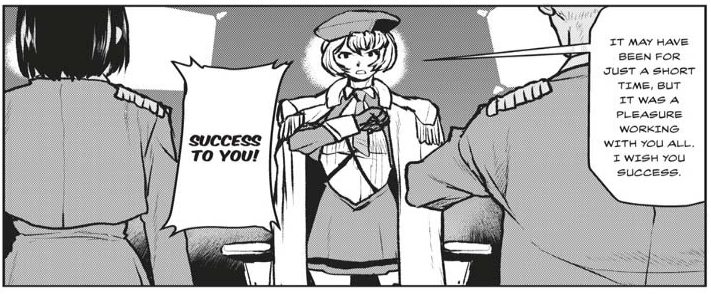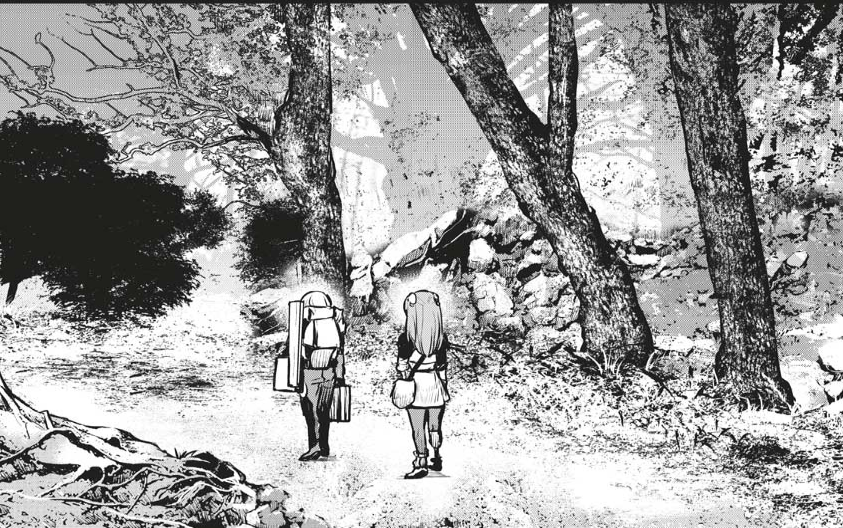Critiquing Captain Corinth
Japanese fantasy light novels typically fall into either the sci-fi or hard fantasy genres. Stories usually revolve around aliens and advanced technology, such as Yoshiki Tanaka’s Legend of the Galactic Heroes, Hiroyuki Morioka’s Crest of the Stars, and Haruka Takachiho’s Dirty Pair, or revolve around swords and sorcery, such as Ryo Mizuno’s Record of Lodoss War, Fujino Omori’s Is It Wrong to Try to Pick Up Girls in a Dungeon?, and Kumo Kagyu’s Goblin Slayer. Hybridizations of hard sci-fi and hard fantasy in Japanese media such as Leda: Fantastic Adventure of Yohko and Magic Knights Rayearth exist, but they’re much less common than stories aligned to just one conceptual genre. Author Atsuhiko Itou’s 2017 web novel series Captain Corinth: The Galactic Navy Officer Becomes an Adventurer is one such story that merges the boundaries of sci-fi and traditional fantasy. The ongoing prose fiction series that’s currently bound in four Japanese light novel releases launched a manga adaptation in 2020. One Peace Books will begin publishing the official English language translation of the Captain Corinth: The Galactic Navy Officer Becomes an Adventurer manga in December 2022.
The Captain Corinth story begins far in the future when humanity has been warring against the alien “bugs” for over a thousand years. Imperial space navy Lieutenant Alan Corinth is automatically promoted to Captain when his starship is attacked and all of his crewmates killed. With the starship rapidly losing integrity and oxygen, Alan jettisons to a nearby planet. Initially expecting to have to spend the rest of his life in wilderness survival, Captain Alan discovers that his new planet is inhabited by pre-industrial humans. Moreover, unlike virtually every other human civilization in the known universe, the humans of this remote planet have the ability to use magic. So with rescue and return to his familiar culture in doubt, Alan Corinth sets about learning to integrate into his new, unfamiliar home.
Veteran manga artist Takuma Tomomasu, whose prior works include the Record of Lodoss War: Grey Witch, Kurogane Communication, and Code Geass: Nightmare of Nunnally manga, brings his experience and pen to the Captain Corinth manga adaptation, basing his character designs upon those of himesuz, who drafted the original light novel illustrations. For the Captain Corinth manga, Tomomasu uses both extensive textural detail and screentone. The granular moiré results in a visual aesthetic reminiscent of 1980s and 90s manga. The dense yet slightly hazy look feels similar to early Masamune Shirow artwork and just slightly comparable to Tsutomu Nihei’s Blame. The character design style uses thick defined lines comparable to the work of Daisuke Ashihara in order to create a look that feels very similar to anime and a bit less like typical manga. The first manga volume includes no human against human antagonism but does depict some mildly gory depictions of “Bugs” and wild forest animals attacking humans. The manga also includes one panel of obscured female nudity.
Narratively the manga is entirely expository and introductory, familiar but not bad. After briefly introducing Alan Corinth, the narrative transfers him to the undeveloped planet where he encounters the young refugee girl Cleria Starvine. Alan rescues her from attack by a wolf pack and nurses her back to full health, along the way learning the principles of magic use from her. So practically little occurs within the first manga volume, but the foundation sets the groundwork for the story to expand and become more dramatic and compelling. The 184-page first manga volume contains six chapters and brief afterword comments from manga artist Takuma Tomomasu, original novelist Atsuhiko Itou, and original illustrator Himesuz.
The manga’s English translation contains three instances of mild adult language. Moreover, the script contains occasional details and plot revelations that may seem illogical or incongruous to demanding readers. The human war against the bugs has been ongoing for over 1,000 years. Such a prolonged active and aggressive war, especially in an era of highly advanced technology, seems difficult to believe. Similarly, specific developments in Imperial technology seem inconsistent. Instant knowledge implantation technology, casually referred to as “brainwashing,” seemingly only used for necessary training purposes, exists but is only used on select military officers in select situations. No explanation is provided for why the military wouldn’t apply this advantageous technology to all of its soldiers. The narrative implies that the Empire has a passing awareness that some sort of mysterious magical power exists within select human communities, yet over seemingly hundreds of years, the Empire has made no effort to learn more about this new magical power. Internal nanomachines grant Alan the ability to strengthen his vision and stamina yet don’t give him any enhanced ability to see in the dark. Despite the Imperial Navy having been at war for over a thousand years, Navy battleships apparently have no back-up control systems in case the primary mainframe becomes inaccessible. Perhaps just because of the needs of the manga visual medium, the AI hologram Iris Conrad still projects even when she’s alone. These seeming narrative goofs may have logical explanations in the original novels. Or they may be minor enough that most readers won’t stumble over them.
Although not directly comparable the scenario of Captain Corinth: The Galactic Navy Officer Becomes an Adventurer feels reminiscent of the 2013 anime series Gargantia on the Verdurous Planet. The story revolves around a single soldier from a technologically advanced planet dropped into a world hundreds of years younger in awareness and technology. The alien “bugs” nonwithstanding, Captain Corinth also feels reminiscent of Heinlein’s Starship Troopers in the way that it tells a slow-build, grounded and realistic military-tinged story. And Captain Corinth is comparable in many respects to author Ryuto’s light novel series Reborn as a Space Mercenary: I Woke Up Piloting the Strongest Starship although Captain Corinth excludes the reincarnation trope and is primarily terrestrial-based rather than starship-based. Readers anticipating breathless action or sensationalistic spectacle may be underwhelmed by the first volume of Captain Corinth. But readers who are interested in immersing into a slightly less conventional epic fantasy, one that breaks out of conventional genre limitations and avoids some of the most commonplace tropes of the light novel medium, will find that the first volume of the Captain Corinth manga is a welcome portal.
